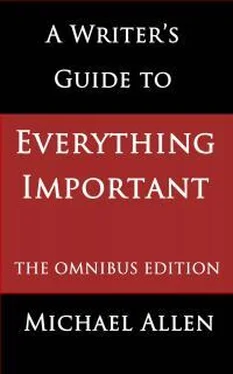You will also have noticed that it is not always necessary to have nice guys as your heroes. It is possible, if you get the alchemy right, to write about people who are thoroughly unpleasant characters. They may even be out and out criminals, as Donald Westlake’s famous books about Parker demonstrated forty years ago; some of those books are still in print.
Another circumstance which must be faced, of course, is that there is no such thing as a book, or a play, that everyone enjoys. Some people come out of a cinema raving about a movie, and others just can’t wait to get to bed and forget it. What some people find deeply moving, others find boring, or worse.
A good many years ago there was a famous cartoon of a couple coming out of a theatre which was showing Death of a Salesman . This play was, at the time, a smash hit on Broadway and was widely held in intellectual circles to be a hugely important Comment On Our Times. In the cartoon, the man says to the woman, ‘I’ll get you for this.’
In other words, the man obviously thought that he was going out for a bit of harmless entertainment, a few laughs, and maybe the odd dancing girl with nice legs. And what did he get? He got Willy Loman committing suicide.
Or so I understand. I’ve never actually seen Death of a Salesman myself, and I’m not about to. I’ve read about it, of course. Endlessly. It’s one of the most significant pieces of serious theatre in the entire twentieth century. Or some such.
I am not very keen on serious stuff myself. My daughter the doctor asks me, ‘Dad why do you read trash all the time?’ And the answer to that is, because I like trash, that’s why. I find it more fun, and most of the time I find it better written too.
Which reminds of me seeing a play called Tolstoy , by James Goldman. This was a serious play – a deadly serious play – about one of the Most Important Writers in History. Or so they tell me. Anyway, this play featured about two and a half hours of Tolstoy being anguished; apparently the poor fellow had a really miserable time being a rich man in feudal Russia. He felt so guilty, do you see.
Towards the end of the play the author brought on a beautiful dancing girl who hopped about the stage for a few minutes, swinging her skirt and showing us her legs. Very nice legs too. The point of this, apparently, was that Tolstoy had been tortured by sexual thoughts and dreams all his life, and this girl symbolised his lifelong struggle, OK?
Now, the thought that occurred to me was this. If only the playwright had brought on this lovely dancing girl about 90 minutes earlier, and had her accompanied by about eleven others, and then brought them back on periodically throughout the play, wearing different costumes, or, preferably, no costumes at all, then we might all have had an enjoyable evening.
As it was, what we did have was a bone-achingly boring couple of hours about an extremely self-centred man. The play went to London, where, not surprisingly, it died a horrible death.
See, there’re a lot of people out there who just don’t like serious, and no amount of telling them that they should will make any difference.
Even a moment’s reflection, then, will demonstrate that the writer’s task, simple in principle, is mighty complicated in practice. Walt Disney was known to remark that making movies is a little bit less scientific than Russian roulette. So, if we, as writers, are going to have any chance of completing our task successfully, we are going to need to know rather more about emotion than we have learnt so far.
8. What can science tell us about emotion?
Not a lot.
In 2001 Dylan Evans published a short survey of scientific research in this area; its title was Emotion – the Science of Sentimen t. Evans tells us that scientific interest in the emotions is currently growing, but the growth starts from a very low base.
In 1997, Candace Pert wrote a book called The Molecules of Emotion. In it, she says that emotion is ‘one of those words that mainstream science likes to spit out at the very first taste.... Unless we can measure something, science won’t concede it exists, which is why science refuses to deal with such “non-things” as the emotions.’
Emotions are rather like a bar of soap in the bath: they’re difficult to get hold of, and most scientists don’t even bother to try. Evans comments that ‘a really good theory of emotion may remain forever beyond our grasp.’ A recent book review in The Times says that an average psychology textbook gives about twenty competing theories of emotion. And as a matter of fact we don’t even have an accepted theory of what consciousness is.
We do, however, know a few facts which can help us to understand human emotions.
Recent research suggests that the present six billion human beings are all descended from a few thousand ancestors who lived in a small region of East Africa, a hundred thousand years ago. The current theory, based on analysis of genetic material, is that the last migration out of Africa, a mere 50,000 years ago, wiped out all previous human inhabitants in Europe and Asia.
Not surprisingly, given the common origin of human beings, there are half a dozen facial expressions which can be recognised and understood by members of all races and all cultures. These expressions are related to the emotions fear, surprise, anger, happiness, disgust, and sadness.
If you show a member of a remote jungle tribe a picture of a Frenchman crying over the death of a child, the tribesman will know that the Frenchman is feeling grief. The experiments have been done by Paul Ekman.
Can we even define the term emotion? Er, no, not really.
In his book on emotion, Dylan Evans doesn’t try to define the term until the last chapter. Then he tells us: ‘Most contemporary philosophers and psychologists who write about emotion reject any simple definitions of emotion in terms of a single criterion.’ (Evans’s book is, however, a useful starting point if you want to learn more about scientific research into emotion.)
For the moment, then, it looks as if us writer guys are just going to have to struggle along as best we can without the benefit of hard science to help us on the question of emotions. But that is by no means the disaster which it might at first appear.
To begin with, while we may not be able to define an emotion very well (or at all) most of us can recognise one when we feel one, or when we see someone else experiencing one. And, fortunately for us, some of the disputed points in emotion theory don’t actually matter very much as far as writers are concerned. Bill Shakespeare didn’t know anything about peptides and receptors and other biochemical mysteries, but he did understand the need for comic relief in a tragedy.
9. An unscientific theory of emotion for writers
In this section, and the two following, I give you the benefit of my own ideas about emotion, as it affects the craft of writing. This theory is based on my readings of various authorities over the last sixty years or so (yes, really sixty).
My theory is essentially unscientific, but I believe it has useful applications despite that. Newtonian physics is not, I understand, sufficiently precise to send a man to the moon, but it will serve very well for building a bridge. The same principle holds good for the theory of emotion which is presented here; it will not meet the rigid criteria laid down by scientific method, but it will help you to write a better novel or play.
Let us begin.
An emotion starts with a stimulus. Something happens to somebody.
As a result of this stimulus, there may or may not be conscious thought on the part of the individual concerned. If there is no conscious thought, there will certainly be unconscious thought.
Читать дальше












